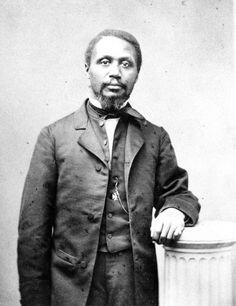Macon Bolling Allen (Macon Bolling Allen)

Judicial Figure. He was the first African-American in United States history to received a law degree and to receive a judgeship. Born in Indiana as a freeman, he was self taught, and ultimately becoming a school teacher in Indiana where he taught for five years. In the late 1830’s he elected to move to Portland, Maine where he established himself in business. While in Maine he became a friend of General Fessenden, then the anti-slavery leader in Maine. Fessender, a lawyer took Allen in as an apprentice to study law and in 1844 was rejected to practice law by the Portland District Court because he wasn’t a citizen. He then applied to be admitted by examination which he took before the examiners. He passed, was recommended and admitted to practice law. On July 3, 1844 before the Western District Court of Maine, he was declared a citizen of Maine with good moral character and, after paying the sum of twenty dollars to the treasury of Maine was granted a license to practice law as an attorney. After several months with little legal work he decided to move to Boston to attract a more conducive clientele. In order to practice law in Massachusetts it was necessary that he pass another examination which he did and was licensed to practice law in Massachusetts on May 5, 1845. In 1848 he was given an examination, passed and was made the Justice of the Peace for Middlesex County. He continued his law practice along with his judge responsibilities until after the Civil War when he moved to Charleston, South Carolina. After awhile in Charleston he and William J. Whipper joined forces and began a law partnership. In the early 1870’s he became involved in politics and was nominated for Secretary of State on the Republican party ticket. His run for Secretary failed as did his quest for a judgeship in the Inferior Court. When the South Carolina State Senate met in February, 1873 to elect a replacement for a deceased judge, Allen after a heated contest was successful, receiving eighty one votes to his closest rival who received forty nine. The court he was elected to had jurisdiction over all criminal cases, except those of a capital nature. This election made him the first black justice in the United States followed by William Gibbes of Arkansas later in 1873 and George Ruffin the first black judge in the north in 1883. In the 1880’s he moved to Washington, D.C. to work as an attorney for the Land and Improvement Association. After fifty years of legal service he died in Washington, D.C. He was considered the first black man in the United States to receive a law degree and the first black man to have been chosen as a judge. Today many legal organizations and associations are named after him, recognizing the contributions he made to the legal community as well as his leadership in civil rights. (bio by: Saratoga)
Born
- August, 04, 1816
Died
- October, 10, 1894
- USA
Cemetery
- Friendly Union Society Cemetery
- USA

